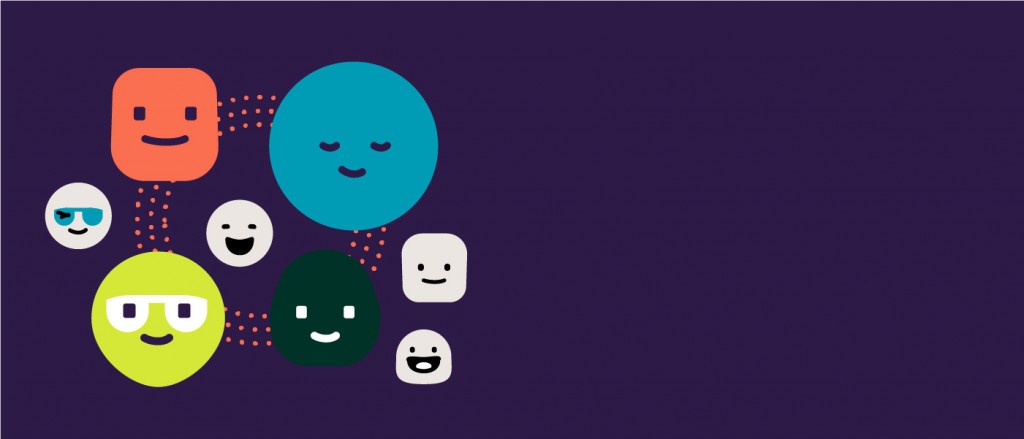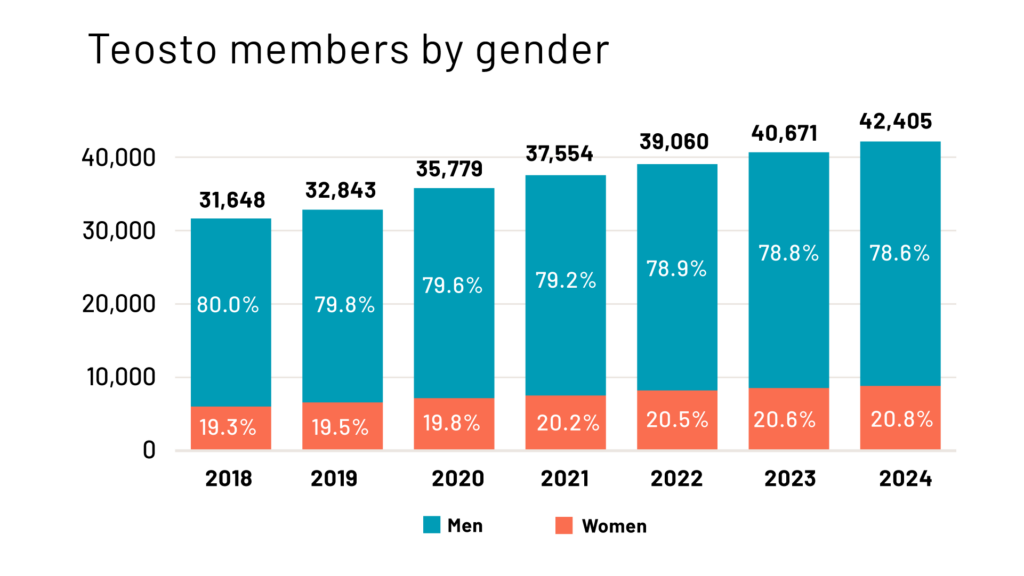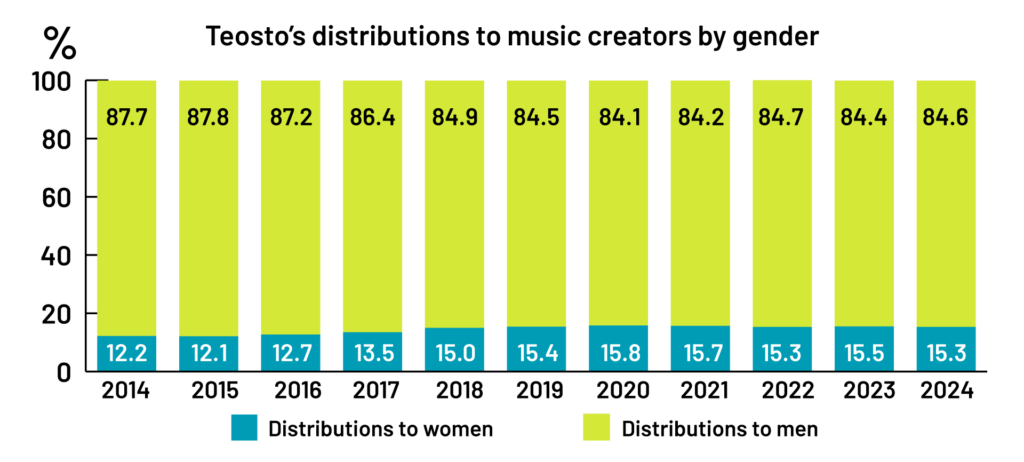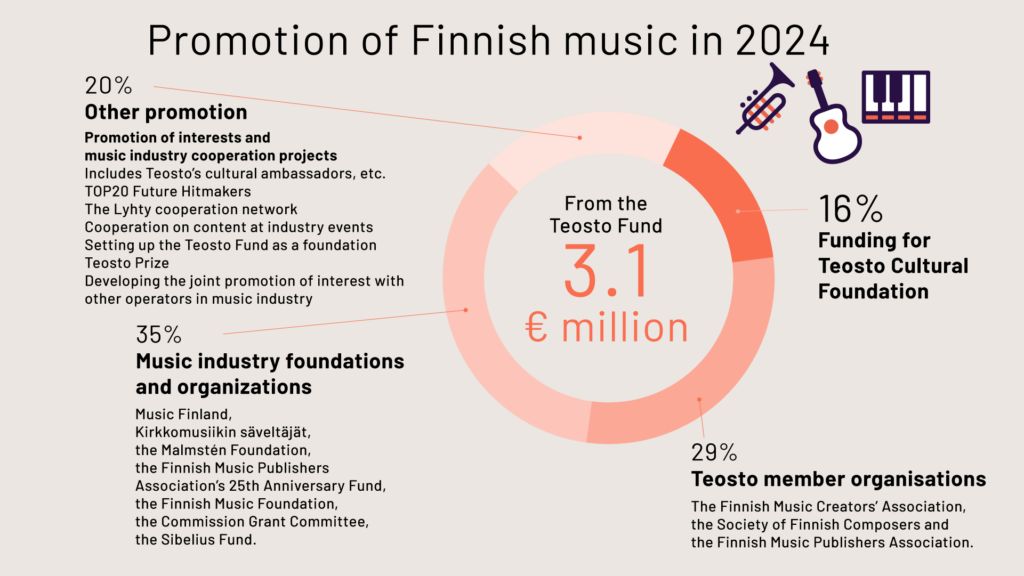
Our goal is a society that is a good place for both making and using music professionally. We aim for the growth and internationalisation of the Finnish music industry, the development of professional competence and increased interest in and appreciation of the music industry. This will help Finnish music and its authors grow and thrive.
We support the vitality of music culture by facilitating the creation of new music and by promoting diversity and equality in music, as well as by working to improve the operating conditions of the industry. In addition, we highlight themes related to music and its creators in our communications.
Promoting a sustainable music industry
Teosto actively works to promote the well-being of its rightholder members by offering financial security, community spirit and support. However, discrimination and inappropriate treatment in the music industry may impair well-being, which means that there is a need to promote equality and fight discrimination.
Our most important task is to promote the well-being of rightholders through concrete actions.
- We collect and distribute royalties to music authors and publishers for the public performance and reproduction of their music, which enables the success of a professional Finnish music author. In 2024, Teosto collected more royalties than ever before, a total of EUR 80.3 million (2023: EUR 75.7 million).
- We actively participate in public debate and work to improve the social security and working conditions of music authors. In October 2024, Teosto took part in a broad creative sector statement that demanded that the Finnish Government eliminate the deficiencies and poverty traps in the social security system.
- During the year, we met numerous rightholders, and we aim to serve our rightholder members according to their individual needs. We also strengthened our cooperation with managers and labels, and we believe that this will allow us to provide an even better service to our rightholder members.
- At the beginning of October, the Kehuja ketjukirjeenä (“Praise in a chain letter”) campaign was launched at the Music x Media event. It provided a platform for Finnish music and culture actors to share thanks and appreciation with each other. The campaign received praise over 300 times during the month. It was organised by Teosto, the Finnish Music Creators’ Association and the working group for Musamimmien päivä.
- We also aim to highlight working conditions in the music industry to make it possible for music authors to combine work and leisure in a sustainable way.
Read more about Teosto’s social responsibility actions in 2024
eosto strives to promote equality and diversity among music authors. One of the focus areas of our strategy is to ensure that everyone has equal opportunities to get into and work in the music industry. For us, this is a way to ensure that the music culture of our small language area continues to be rich and evolving in the future.
In 2024, women accounted for only 21% of Teosto’s private individual members, which is the same figure as last year. The proportion of women has increased slowly, although the proportion of women was slightly higher among new members, amounting to 25.6%. Unfortunately, we are currently unable to compile statistics on the number of non-binary people among our members, but, according to a gender equality survey conducted in the music industry in 2024, their share among people operating in the music industry is about 3%.

On the other hand, the gender distribution in Teosto’s staff is female-dominated. In 2024, 62% (2023: 61.8%) of Teosto employees were women. Four out of nine management team members and three out of six board members were women. In 2024, the average age of all Teosto employees was 47.3 years (2023: 49.2). Teosto also has various task forces and committees that prepare matters for decision-making. Of the members of these groups, an average of 38% were women. In this context, the Conciliation Committee, the three members of which were all men, attracts attention. The Investment Committee and the Cooperation Forum, for example, had equal numbers of men and women.
In 2024, the share of women in royalties paid to music authors was only 15.3% (2023: 15.5). This figure has also remained relatively unchanged over the past 10 years. Women’s earnings were the highest in music played on the radio, with up to 21.1% of distributions paid to women. On the other hand, women’s share of the distributions paid in the online category (digital streaming and social media platforms) was only 12.2%.
Women also registered fewer works: in 2024, Teosto’s female private individual members had an average of 6.3 registered works per author, while the corresponding figure for men was 8.3. Of the annual number of registered works, 78.5% only had male authors.

In 2024, we took several measures to promote diversity and equality. One example of this was the extensive equality survey carried out in the spring, with which we raised the issue of discrimination and inappropriate treatment in the industry. In connection with the publication of the results, we also extensively shared information on the guidelines and measures in use in the industry to promote equality.
As an employer, we have signed the theses for promoting equality, non-discrimination and diversity in the music sector and, in our equality plan, recorded measures to guarantee everyone a safe work environment that is free of discrimination. In connection with the update of the equality plan, we also conducted an equality survey for our personnel in 2024, and the plan was updated on the basis of the results. The achievement of equality and non-discrimination is monitored by the cooperation group, which assesses the situation annually.
Teosto implements various communications projects to ensure the visibility and appreciation of different music genres and author groups and, therefore, the diversity of Finnish music. We want to highlight all the diverse music making methods and author groups that are part of the rich Finnish music culture. The equality survey conducted in 2024 provided us with extensive information about the position of different groups in the Finnish music industry.
Awarded since 2003, the Teosto Prize is one of the biggest art prizes in the Nordic countries. Every year, we award it to one or more Finnish works of music. With the prize, we also want to support the diversity of genres and increase appreciation for the work of music authors in society. The prize allows us to recognise bold, original and innovative works of music. In spring 2024, the EUR 40,000 Teosto Prize was divided between two winners.
Since 2018, we have presented the Music Author of the Year award at the Iskelmä Gaala as a recognition of special achievements in creating a wide range of schlager music. In 2024, the award went to Antti “RZY” Riihimäki.
At the Emma Gaala for music producers, we are a partner of the Song of the Year category, highlighting the people behind Finnish hit songs. The 2024 Song of the Year award was won by Timanttei, a song performed by Mirella and written by Ilon Adlercreutz, Kim Mannila and Emma Johansson together with Mirella.
The “Vuoden musiikkioivallus” (the Music Innovation of the Year) award, which highlights the use of music in AV productions, was presented for the third time in 2024. The award for innovative use of music went to the documentary series Lähiöbotox: African Metal Tour.
We also award a EUR 2,000 prize for exemplary reporting of performance information. In 2024, the prize was awarded to Heidi Pakarinen.
We aim to help young, new talents break into the music industry by holding an annual Top 20 Future Hitmakers course for young music authors. The objective of the course is to help young music authors advance in their careers and network with other music industry professionals as well as to inspire them to create new music. The course is held in cooperation with the Finnish Music Publishers Association, the Finnish Music Creators’ Association and Music Finland. In addition, in the summer and autumn of 2024, we organised the Uudet Soundit (“New Sounds”) campaign with our live category customers to get new young performers into the summer’s big festivals.
We are also a partner of the Finnish contemporary classical music festival Musica Nova and of the composition and lyrics competition at the Seinäjoen Tangomarkkinat tango festival.
As an employer, we also actively create opportunities for younger people to work for us. To support this, we launched the “Nuoret ja Teosto” (“Youth and Teosto”) concept in 2021, through which we offer young people interested in the field work experience periods, internships and part-time employment opportunities.
Promoting Finnish creative music is an important part of our mission. We want to bear responsibility for the vitality of music culture by promoting the creation of new music, the diversity of music and the working conditions of future generations of authors.
In 2024, a total of EUR 3.1 million was spent on music promotion activities. The funds allocated to support activities are the cultural contributions withheld for national promotion activities, which the association withholds on the basis of the decision of its voting members. The sufficiency of these funds is ensured through asset management by means of the Teosto Fund, for example.
Our financial support is directed at a wide range of recipients, such as Teosto’s member organisations (the Finnish Music Creators’ Association, the Society of Finnish Composers, the Finnish Music Publishers Association), the Finnish Music Foundation and Music Finland. Through their own grants and funds, these organisations support the diversity of music and creative musical art.
We grant direct grants in the form of a grant for score-based music, which is intended for Finnish notated works, and a commission grant, with which we promote Finnish composition commissioning and the creation of new fully scored music.
In 2024, we made our most significant one-off investment in the promotion of Finnish creative musical art by establishing the Teosto Cultural Foundation. In 2024, we donated approximately EUR 10 million in investment assets in the form of shares in funds to the foundation as the principal. We also donated EUR 0.35 million in working capital to the foundation and EUR 0.5 million to be used for support activities. The foundation also awarded its first grants, with a total of 68 music authors, composers or organisations receiving the grants.

Teosto engages in dialogue with decision-makers to ensure that the importance of Finnish music culture and the creative primary production of music to Finnish society is recognised and understood. The goal of our lobbying efforts is to ensure good working conditions and long-term financing. We report our lobbying activities to the Finnish Transparency Register. In 2024, we contacted a total of 77 decision-makers and public officials.
In 2024, the focus of the advocacy and lobbying efforts of the joint advocacy of Teosto and its member organisations was lobbying related to the Government Programme. The key projects to be promoted in the Government Programme included the preparation of a cultural policy report, the preparation of combined unemployment insurance and growth measures related to the creative economy. The industry’s lobbying efforts also focused on legislative lobbying related to the EU AI Act and its implementation in Finland and at EU level. We issued statements and opinions on these topics and actively kept in touch with the parties preparing the decisions.
The cuts targeted at the cultural sector and the increases in VAT resulting from the government discussion on spending limits in spring 2024 were painful for the music industry, which is still recovering. Their impacts could only be mitigated to a very limited extent through lobbying.
The budget cuts implemented by the Government also sparked discussion about the private copying levy. The Government’s decision to cut the appropriation for the levy by 50% could not be changed despite active communication campaigns and petitions involving international associations. In August 2024, the Ministry of Education and Culture began to investigate the future of the levy. The final report of the investigator was published in February 2025 and preparation will continue on the basis of its proposals.
At the EU level, the European Elections held in spring 2024 were also very important. For these elections, we launched the objectives for the European Elections by the joint advocacy for the creative primary production of music. To promote the election objectives, we carried out active election-related communications and held a launch event at the Port of Music, as well as established contact with the new Finnish members of the European Parliament.
At the international level, we carry out lobbying within the frameworks of our international umbrella organisation CISAC and our European umbrella organisation GESAC. Teosto’s CEO Risto Salminen is a member of the GESAC Board of Directors. At the international level, our lobbying efforts were focused particularly on the AI Act adopted in the EU in summer 2024 and its implementation, as well as the broader global discussion on the impacts of AI.
Through Teosto’s cultural ambassador activities, we maintained contact and increased grassroots-level interaction between music professionals and the people deciding on their working conditions. The network’s members include about 70 Members of Parliament, music authors and publishers, who form pairs of ambassadors. In 2024, we held two joint events for cultural ambassadors as well as numerous smaller, one-on-one meetings.
We influence the development of the music industry in cooperation with other players in the industry. We do this together with other copyright societies, within the Luovan työn tekijät ja yrittäjät ry cooperation network.
Through the Musiikkiala.fi website, we share independent research findings on the impact of the music industry on society. In addition, as a joint effort of the music industry, a Music Talks panel discussion on the topic of internationalisation that was aimed at decision-makers was held during the Helsinki Festival.
Following the publication of the Core Principles for Artificial Intelligence Applications in 2024, Teosto published instructions for registering music produced with the help of AI in summer 2024. Teosto also commissioned a survey on the use of AI in the music industry. According to the survey, AI is already an everyday tool. We are also involved in the LuovAIn project formed by four higher education institutions, which develops ways for creative and cultural sector actors to take advantage of AI in their own work and adapt to the changes brought about by AI.
Twice a year, we hold Teosto Talks events to discuss current issues in the music industry. In 2024, the topics were the financing of music in the future and the development of streaming.
The first phase of copyright societies’ ISNI project was completed in the autumn.
The ISNI (International Standard Name Identifier) is a globally used author identifier that uniquely identifies individuals and organisations associated with any creative work.
We are also involved in more extensive research and investigation projects. The aim of the study Kulttuuripolitiikka korona-ajan Suomessa. Kuinka jatkaa tästä eteenpäin? was to assess political decision-making targeted at the cultural sector during the COVID-19 pandemic from the perspectives of jurisprudence, social sciences and the principles of good governance and democracy.